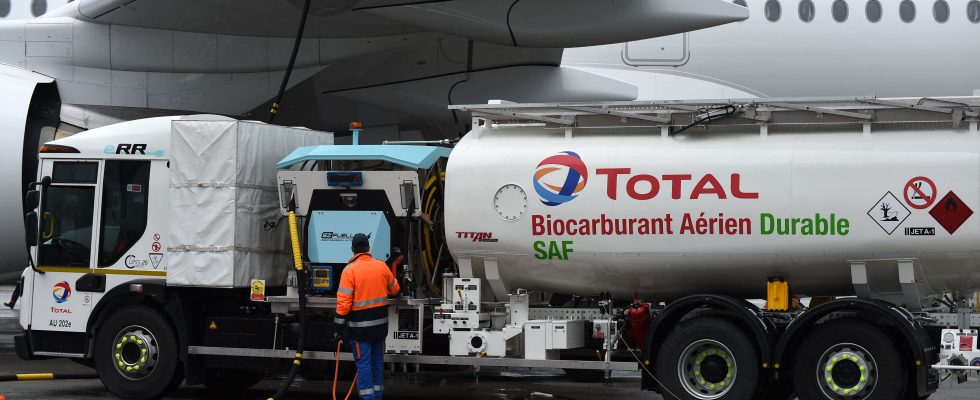No less than 8.5 billion euros between now and 2027 will be mobilized to transform air transport. This Friday, June 16, Emmanuel Macron finally unveiled his announcements for the sustainable aviation sector, long awaited by industry players. During a visit to the Safran factory, in Villaroche in Seine-et-Marne, the President of the Republic announced the upcoming installation of a biofuel factory in the Pyrénées-Atlantiques, in Lacq and an increase in funding for the transition of this sector. An envelope of 300 million euros per year will be devoted over the period 2024-2030 to the design of new planes and new engines, and 200 million euros will go to biofuels. In Lacq, the BioTJET project led by the company Elyse Energy could create 100 jobs on the site and 600 for all recycling players, according to Emmanuel Macron, and should also make it possible to set up the first links in French production of these new fuels. .
Created from food residues, such as cooking oil, or forestry waste, these “sustainable aviation fuels” (CAD) have the advantage of having a very low carbon footprint during their life cycle and form the keystone of the transformation of the air system, well before the electric or hydrogen aircraft. “Hydrogen planes won’t arrive for another 20 years and will have limited use, but DACs are already available to quickly reduce emissions”, explains Paul Chiambaretto, professor at the Montpellier Business School and director of the Pégase chair devoted to the economics of air transport. Across the sector, the use of these fuels would make it possible to achieve half of the decarbonization path by 2050.
Solutions that already exist
Above all, they represent an immediately transposable solution. “Today, all aircraft can fly with a rate of sustainable fuels reaching 50%”, explains Nicolas Jeuland, expert in fuels of the future at Safran. However, these are still very little used, due to their availability, but above all their cost: they are 3 to 5 times more expensive than conventional kerosene. Although they currently only make up around 1% of the fuel used by Air France on its flights departing from France, their share should increase. Because France is one of the first countries to have defined a roadmap: it provides for an incorporation rate of 2% in 2025, 5% in 2030 and 50% in 2050. Objectives in line with the framework European regulation recently found between the States and the Commission.
However, to keep pace, production will have to increase significantly. “We will need 1.3 million tonnes of CAD for aviation in 2035,” predicts Olivier Gantois, president of Ufip Energies et Mobilités, the lobby that brings together energy companies. Based on existing refineries and those planned, the organization estimates that the national production of CAD could reach between 300,000 and 400,000 tons in the coming years. In the meantime, companies are preparing, sometimes aiming higher than national ambitions. Air France has announced that it wants to incorporate 10% of CAD in 2030, and is already signing supply contracts with foreign suppliers. Although having reached an agreement with TotalEnergies for its first deliveries of sustainable fuels, the company also hopes to import 1 million tonnes thanks to the Finnish oil company Neste between 2023 and 2030, and is turning to American production – largely subsidized by the government – , now less expensive.
Accelerate its structuring
Because this question remains open. Who will pay the additional cost of SAF? The companies are counting on an increase in the price of the ticket for the consumer, but hope to distribute the additional cost between the various actors of the chain with, in the long term, a fall in the price of the CAD.
To resist foreign competition, European and French industry must speed up their structuring. “For the moment, everyone is looking at each other while waiting to see who will move first”, notes Vincent Capo-Canellas, senator for Seine-Saint-Denis and rapporteur for the fact-finding mission on the development of the sector. Above all, the sector is waiting for a signal from the public authorities. “We need strong action to support the offer and help the development of production units”, we plead at Safran.
Friday the President of the Republic seemed to take a big step towards the sector, ensuring “to be alongside the big players” like TotalEnergies, Engie or Avril. The ultimate goal is to produce in France, by 2030, the 500,000 tonnes of sustainable air fuel necessary for European objectives.
